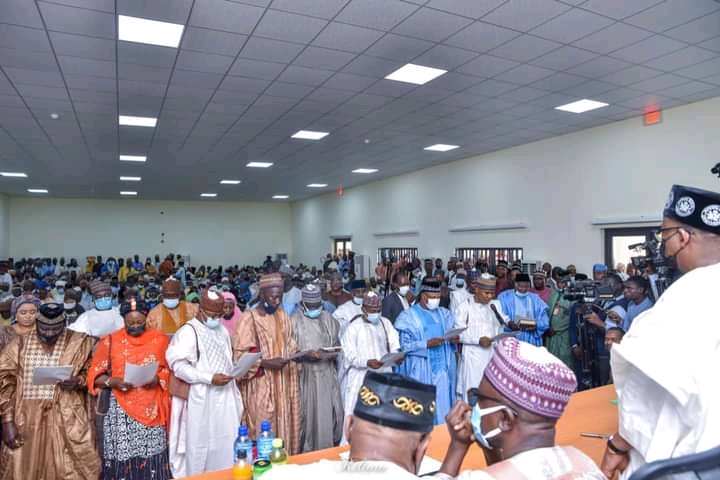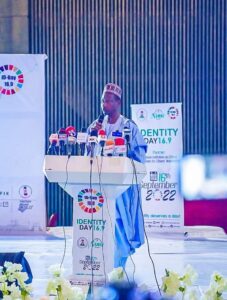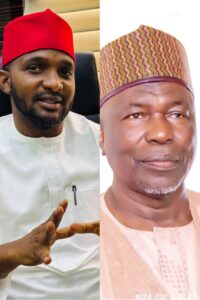
By Sulaiman Maijama’a
In politics, the toughest time to give appointment, is when election is approaching. This is so, because the appointee must keep a balance between allegiance to their boss and responsibility in the interest of the masses. I’m happy that Governor Bala Mohammed, during the swearing-in ceremony of the members of his state executive Council, did not mince word to tell them to “serve with 2023 in mind but, marry the need for politics with respect for official duties.” This is a hint of the daunting tasks and the challenges the appointees have ahead.
Governor Bala who said all the appointees were selected after wide consultation, it is assumed that they are highly experienced technocrats who have traversed different political evolutions and who would bring their wealth of experience into play for the betterment of the people. To be blunt, huge expectations developed on them; they owe loyalty to the governor and responsibility to the public. How ready, then, are the appointees to face the realities in order to justify the confidence reposed on them
Shaykh Abdullahi Ibn Fodio in Diya ul-Hukkam says ” authority swings between worldliness and piety and every wise and faithful man must put away worldly motives from him and trust in the Almighty and seek His help in all affairs. Let all your works be onto him, and remember that you are only one of His creatures. Many would be more powerful than you if it were not for His help. So let all your hopes and fears be in the Almighty and all your cares centered on the welfare of His creatures. The Almighty has not invested the one in authority with the power that he may load it over his subjects and dominate them but, rather to foster their spiritual and material well-being.
In my view, serving with the fear of the Almighty, being the fruit of wisdom and with people at heart will serve all the purposes. It is for this reason I bring to the sworn-in appointees a few quotes from the book “Principles of Leadership”. These quotes as they pertain to leadership and governance were retrieved from various archival collections of the founders of Sokoto Caliphate, Shaykh Utan Inn Foduye, his brother Shaykh Abdullah Bin Foduye and his son Caliph Muhammad Bello.
1) LEADERSHIP AS GOD’S TRUST:
Imam Muhammad Al-Maghili is quoted as saying “political power is a vicegerancy from Allah and a stewardship from God’s Apostle. How great, then its dignity and how heavy are its burdens. If a leader follows the path of righteousness, piety will take ascendency over their worldly desires, if he goes astray, his piety will fall victim to worldly lust. Therefore, fear the Almighty (perchance you may succeed) know that every soul shall have a taste of death and you shall receive you full recompense on the Day of Judgement.”
2) LEADERSHIP AS ACCOUNTABILITY:
Caliph Muhammad Bello was quoted in “Usul al-Siyasa” to have said “one of the serious misfortunes that may befall a leader for the consequences of having to render a full account of the office. Normally every individual servant is accountable for his speeches and his actions. But if he is made a leader, he shall, in addition to his personal responsibilities, be held accountable for his subjects. So if he cannot discharge his personal responsibilities adequately, how will his position be if he were to be held accountable for the actions of his subjects?”
3) LEADERSHIP AS JUSTICE:
Shaykh Uthman Ibn Foduye in “Bayan Wujub al-Hijra” says “a leader gains victory over his enemies according to his justice over his people and is defeated in his struggles according to his injustice. It is in the interest of justice to treat equally any two disputants with
regard to their entry into his presence; the way they sit, the way he looks at them, how he addresses them and in all matters connected with them without showing favour to either of them. The lease must sit in audience every day where people and especially women and children reach him.”
4) LEADERSHIP AS SERVICE TO THE PEOPLE:
This is of the the most important thing to take into consideration. Shaykh Abdullah Bin Foduye is quoted as saying “a leader has to see to the welfare of the people.” His brother Shaykh Uthman Ibn Foduye says “seeing to the welfare of people is more effective than the use of force. It has been said that the crown of a leader is his integrity, his stronghold is his impartiality and his wealth is the welfare of his people.”
5) LEADERSHIP AS GOODNESS:
In his book “Bayan Wujub al-Hijrah, Shaykh Uthman Ibn Foduye says “goodness is the source of nobility of character. Since the Almighty knows that not every leader prospers through justice alone, but also in stands in need of goodness which is superior to justice. Subjects stand in relation to a leader in three groups: old, young and mid-way between the two. The leader must treat the old one as a father, the middle one as a brother and the younger one as a son. Let him, then, be dutiful to his father, generous to his brother and affectionate to his son.”
To conclude with glad tidings from the messenger of Allah (PBUH) who says: “justice of a leader for a single day is better than the devotion of an ordinary man for seventy years.” In another traditiona he says: “the favourite and closest person to Allah is a leader who is just.” The Messenger of Allah (PBUH) additionally is quoted as saying ” the good deeds of a just leader will be recorded in heaven as equal in worth to the good deeds of his entire subjects, and the reward of every prayer he performs is worth the reward of Seventy Thousand (70000) prayers performed by others.”
” ‘Since this is so’, according Shaykh Muhammad Bello, ‘ there can be no greater blessing for a servant of Allah than to be granted a rank of leadership, for Allah causes one hour of the leader’s life to be worth the entire existence of another person. Whoever does not comprehend the significance of this and keeps himself busy with oppression, may risk being placed by Allah among His enemie’ “.
My best wishes to all the appointees!
Maijama’a, Faculty of Communication, BUK
sulaimanmaija@gmail.com


